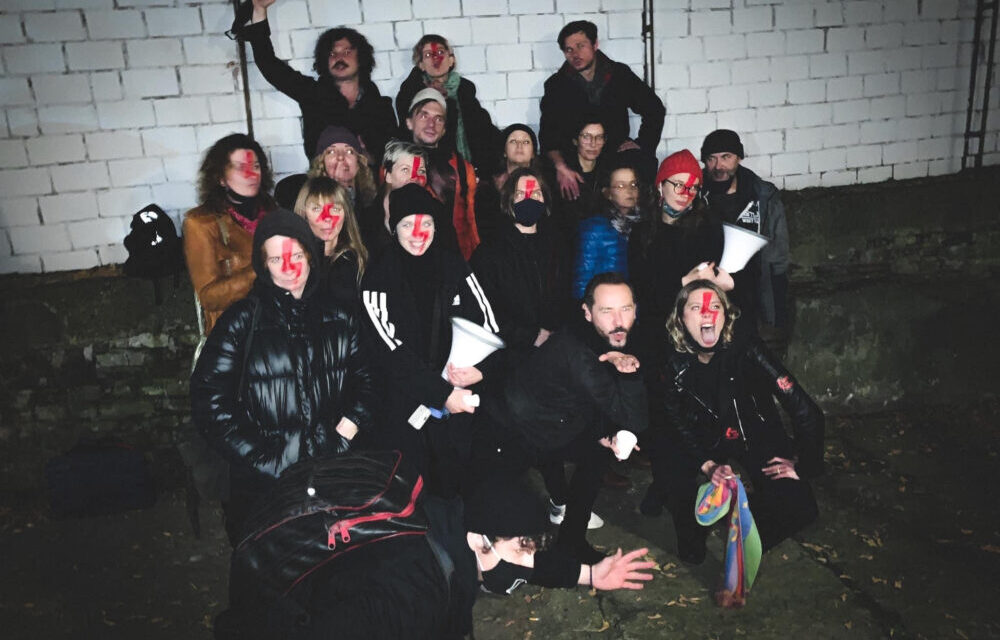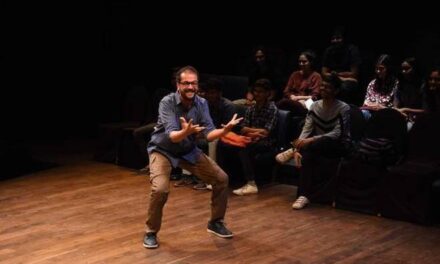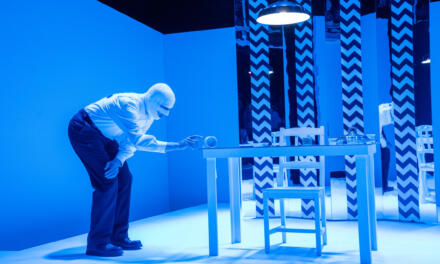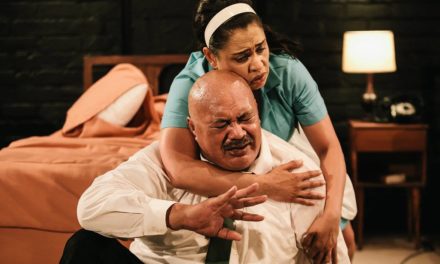Adam Mickiewicz’s Dziady (Forefathers’ Eve), written between 1820 and 1832, is considered sacred to Polish national theatre’s heritage. Its title refers to a pagan festival held on the 31st of October, during which the living communicate with spirits. The word “dziad” also means “forefather” and “old geezer.” The below review focuses on a happening based on the play which was performed on 31 October 2020 at Adam Mickiewicz Street in Warsaw’s Żoliborz, the neighborhood where Jarosław Kaczyński, leader of the Law and Justice party currently ruling Poland, lives. At the time of the performance, protests were happening in Poland following a ruling that abortion of malformed fetuses is incompatible with the constitution, ultimately banning abortion in Poland.
Brotherhood and citizenship
For woman
Life companion
And laws equal in all respects
—— Adam Mickiewicz, A Set of Principles, Rome, 29 March 1848
Staged at 34/36 Adam Mickiewicz Street in Warsaw’s Żoliborz district, the performance/ritual of Dziady, a “sacrilegious rite brimming with wrath, ”was an act of defiance and resistance. Dziady at 34/36 Mickiewicz Street happened on 31 October 2020 in response to the Constitutional Tribunal’s ruling tightening Poland’s abortion law. The principal performative act was the sending away of the “dirty” (see Młynarska, 2020) old men and women, the boomers who denied us the right to make our own choice to decide about ourselves, our bodies, our lives, our sexuality. They are the patriarchal old geezers who, in alliance with the Polish Catholic Church, guard the violent mechanisms to which Polish women are subjected in the familial, economical and social spheres. The Polish word “odprawić” means both “to perform,” but its second meaning is “to send away;” in this context, it asks certain people to leave the political arena where the fate of women is decided. It urges them to go away, be gone, get out of here, clear away, scram, #wypierdalaj dziadu (#pissoffoldgeezer).
This is what Leszek Kolankiewicz writes about Mickiewicz’s Dziady: “Revivals of this drama have the extraordinary ability to act as salient meta-commentary on social life: Aleksander Bardini’s 1955 staging provided commentary on the watershed period which followed the Stalin era, Dejmek’s revival spurred the student protests of 1968, Maciej Prus’s 1979 version heralded the birth of the Solidarity movement in its cradle (Kolankiewicz, 2000, pp. 195‒96). The performance dramatized by Anka Herbut, directed by Oskar Sadowski and performed by actors, musicians, apartment tenants at 34/36 Mickiewicz Street and audience members embodied this extraordinary quality of Mickiewicz’s Dziady, and provided important meta-commentary on civil life in Poland. The ritual of Dziady performed in the current socio-political climate had little to do with a festival for the dead, remembrance, a celebration of mementos, or the coexistence of the living and the dead and their never-ending conversation and efforts at reconciliation.
The poster announcing the event shows Jarosław Kaczyński’s paper-white face, his features marked with pencil, and streams of blood-red liquid rolling down from his eyes.
What a monster! Bless my soul!
See theghost in the window?
He’s whitelike a bone in a field;
Look! Look at his face!
The Dziady ritual in Warsaw’s Żoliborz was held across the street from Jarosław Kaczyński’s house, and the words about the ghost in the window refer to him. There is also no doubt that Jarosław Kaczyński (the Ghost of the Old Geezer in the performance, a contemporary incarnation of Dziady’s Ghost of Evil Lord) is the central protagonist of the ritual of Dziady. The ritual participants assembled outside his windows want to send him away without consolation, mercy, food or water, because anyone who wasn’t a human being even once cannot be helped by humans.
The event announcement said, “On the night when the Dziady ritual used to be performed in Poland, join us for Mickiewicz’s Dziady in Warsaw’s Żoliborz district. Instigated by residents of Mickiewicz Street, a performance drawing on the work of Poland’s national bard will be staged. The ghosts from Dziady Part II return to this earth to seek what they lacked when they were alive. Some of them get what they want while others get what they had generously given to others but would not wish to experience themselves. Karma is a bitch, particularly when part of the population has to fight for their fundamental rights while the authorities turn a deaf ear to what their citizens want.”
At a time when “all is dark” and “all is quiet” in Poland – to paraphrase Dziady’s most famous lines – and we ask the question, “what’s going to happen?” Romanticism again proves to be a gesture, a ritual, and a form of remembrance. However, Dziady at 34/36 Mickiewicz Street cares little about the sacred covenant of community, rebirth, transformation, and renewal. The creators chose Part II of Mickiewicz’s Dziady, which is a clear sign of their move away from messianism (the 19th-century idea that the Polish nation has been chosen by God to be sacrificed for the freedom of the world in a way similar to how Jesus Christ was sacrificed to redeem humanity). If their version can trigger a transformation, it will be one of consciousness relating to a deep disagreement with the shape of the community we’re currently living in. Dariusz Kosiński writes: “Adam Mickiewicz built into Dziady the concept of theatre as an act taking place here and now, exerting a real influence on reality by the agency of the audience.” (Kosiński, 2007, p. 73). The scenario of ritual transformation that plays out in Mickiewicz’s Dziady involves a task for each participant. If any community is created during the Żoliborz performance, it is one of the angry, the disgruntled, or the pissed off. It is a community of those who reject the violence exercised by the authorities. The performance of Mickiewicz’s Dziady screams out loud, driven by a violent, ecstatic rhythm. It is militant in its sonic palette (voices, drums) the movement of the bodies and the red smoking flares, militant like the war the Polish government has declared on Polish women and Polish society. “This is war,” chant the protesters rallying against the controversial ruling. It is about our here and now, about having a real impact; the participants of the Żoliborz happening performed Dziady to make an impact.
Kosiński writes elsewhere: “Now I think that the power of Dziady might derive from the fact that Mickiewicz brought into the “light” of collective life an arch-drama, or perhaps an “archedrama” ‒ a scenario impossible to be reduced to words, or expressed in words, one that can only play out whenever the collective finds itself in deep, fundamental crisis threatening its existence. To be sure, these enactments differ in expressive means, words, images and the way they enfold but beneath these superficially different forms, deep down, shines the dark light of the Dziady scenario that Mickiewicz’s Dziady is still closest to” (Kosiński, 2016). Now the community (of women in particular) has been plunged into an existential crisis ‒ the script of Dziady has been once more re-enacted in Poland, played out to express this crisis and to scream out loud about it.
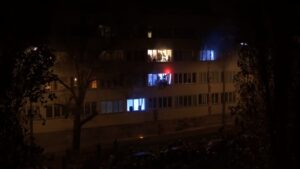
Still from Dziady na Mickiewicza 34/36.
The Sorcerer in Dziady at Mickiewicza Street is a woman who shares the stage with the chorus of goddesses playing ghosts “in the name of the Mother, the Daughter, the Spirit.” First, two children appear ‒ light spirits, Rózia and Józia ‒ asking for two charlock seeds. The collective, resounding cry of “Be gone! Be gone! Be gone!” can be heard from and outside the windows of the Mickiewicz Street building.
Next, the ghost of Zosia, an intermediate spirit, turns up. Wearing a garland of flowers on her head, Zosia comes down from the clouds like a rainbow, accompanied by a rainbow flare. In her earthly life, she was undecided as to whether to go out with a boy, had no desire to get married and preferred to follow a lamb rather than a lover. She doesn’t know whether she is of this world. She is always alone. Zosia has since made her choice.
Michał Szpak, Ralph Kamiński and Maria Sadowska sing a song to music by Baasch:
In the mornings in spring,
Zosia, the fairest damsel in the village,
Tended her lambs,
Hopping and singing a merryair.
My body,
My choice.
When Oleśwanted to kiss her on the lips
For a pair of doves,
The vapid girl but laughed
In scorn ofhis offering and request.
Józio gave her a ribbon,
Antoś gave her his heart,
But coy Zosia
Just laughed:
My body,
My choice.
Back on earth, Zosia may be denied her right to choose.
The last ghost to appear is the Ghost of the Old Geezer (the Evil Lord in Mickiewicz’s play). Speaking the words of the Ghost of the Old Geezer, an off-stage voice imitates the voice of Jarosław Kaczyński ‒ everyone recognizes the heavy, inhuman ghost whom a human being cannot help. We see his face in the window as a video projection. A chorus of birds‒ women who speak together ‒ deny the Old Geezer compassion, empathy, pity and understanding. They tear at the food, rip the flesh into pieces and shout, “Be gone!” Talking to him or negotiating with him is out of the question. they want to send the Old Geezer away for good.
The ghost of the Old Geezer, who in his earthly life had no respect for his fellow human beings and denied their rights, will never find peace, especially here on earth. This is because, according to Mickiewicz’s ethics, you are allowed to challenge God, but you’re forbidden to hurt anyone. This offense would not be forgiven. “Leave us alone! Be gone!” shout the participants in the ritual. This is followed by loud, explosion-like thunder interrupting the ritual of Dziady. Anna Kłos-Kleszczewska poignantly recites the words spoken by the Spirit at the end of the Prologue of Mickiewicz’s Dziady Part III:
Man, if only you knew how powerful you are
When a thought in your head, like a spark in a cloud,
Flashes unseen and pulls together clouds,
Creating fertile rain or thunder and storm;
If only you knew that every time youset a thought alight,
The elements, Satan and angels await
For you strike at hell or light heavens;
And you blaze like an errant cloud,
Knowing not where you fly, or what you do.
People! Each of you could, alone, in a prison cell,
Topple and lift thrones with your thoughts and faith (Mickiewicz, 1984).
Dziady is over. Now it’s time for a political call for courage, agency and action, for giving account of our human, and civil power in the belief that anger can beget change. The communal ritual of anger in Mickiewicz Street ended with everyone singing John Lennon’s Imagine, celebrating freedom and equality. The song was punctuated by performers’ interjections addressed to the Ghost of the Old Geezer: “Mister Kaczyński, we want one world, we won’t be divided!” “We want to have choice!” “Our life is our life, Mister Kaczyński,” “Mister Kaczyński, you won’t sleep easy!”
The Żoliborz ritual of Dziady belongs to all of us, because human rights are not a question of opinion. This Polish Dziady – our Dziady – restores faith in equality, freedom and human rights. The performance also clearly demonstrates that we barely need tribal ghosts, the deaths of past heroes, retrotopian memory or identities immobilized by tradition. Instead, we need more courage and political imagination ‒courage to send away the old geezers, and imagination to help us realize the truth of the slogan of the May 1968 revolt: “Under the paving stones, the beach!”
This was also my Dziady ‒ I joined in shouting with other citizens: “Be gone!”
Dziady na Mickiewicza 34/36 (Dziady at 34/36 Mickiewicza Street)
Concept by Aurora Collective; directed by Oskar Sadowski; music by BAASCH; dramaturgy by Anka Herbut; lighting by Jacquline Sobiszewski; video by Adrien Cognac & PUSSY MANTRA (Marta Navrot & Jagoda Wójtowicz); make-up by Anna Piechocka; poster design by Bartek Arobal Kociemba
Recordings by Wojciech Kaniewski and Adam Abramczyk; drums by Anna Sierpowska – Movement Medicine, Agnieszka Dziewanna, Anna Szyszka; combative fan dance by Lia Stula, Sylwia Domańska, Anna Juniewicz, Patrycja Pati, Ula Bogucka; scenery by Malwina Konopacka, Teresa, Aniela I Jula, Piotr Kowalski; grassroots initiative by the residents of the building at 34/36 Mickiewicz Street; produced by all.
The article was first published in Polish in Didaskalia, No. 160 in December 2020. It was translated by Didaskalia into English for TheTheatreTimes.com. The contextual additions by Kasia Lech were for the English translation only and are all in italics. To read the Polish text, click here.
Didaskalia is now an open-access journal appearing bimonthly.
This post was written by the author in their personal capacity.The opinions expressed in this article are the author’s own and do not reflect the view of The Theatre Times, their staff or collaborators.
This post was written by Łucja Iwanczewska.
The views expressed here belong to the author and do not necessarily reflect our views and opinions.

